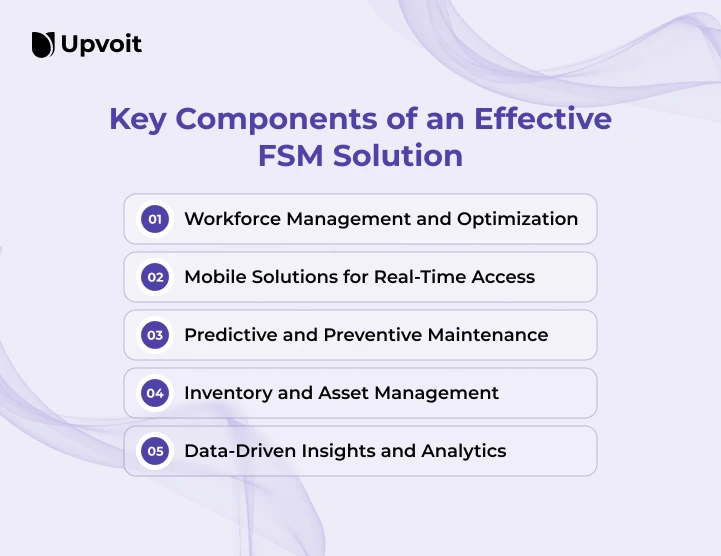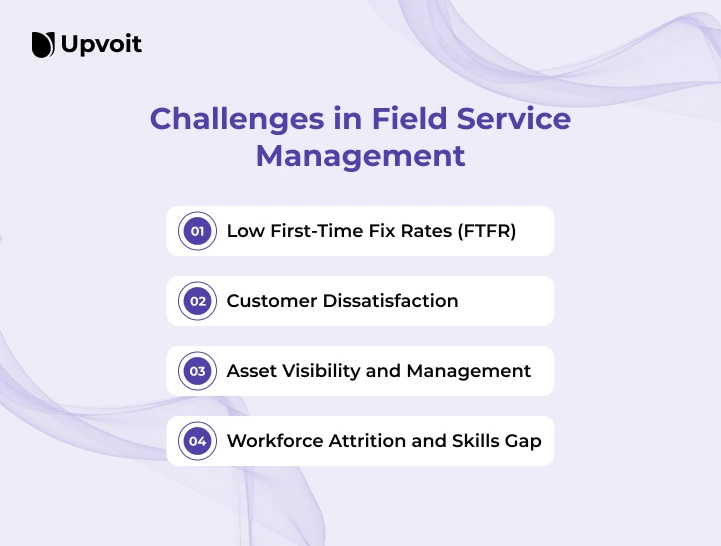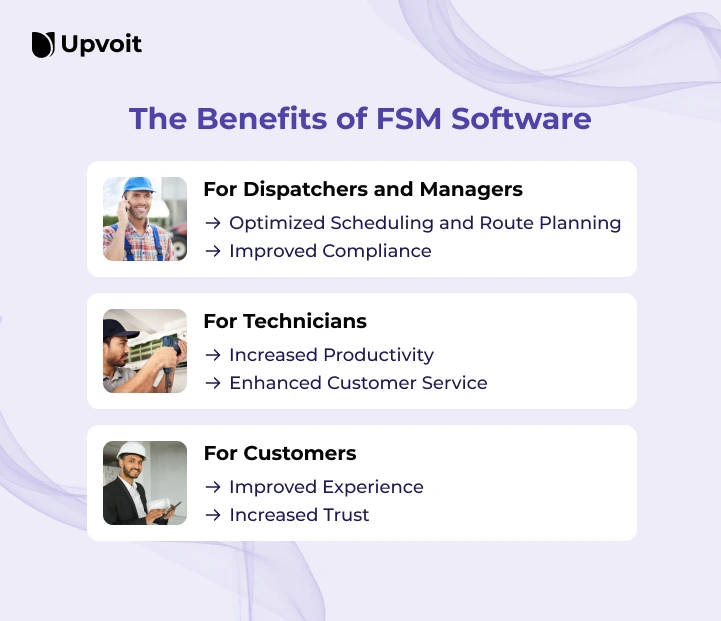Maximizing Operational Efficiency with Advanced Field Service Management (FSM) Solutions
Kevin Bhut
Co-Founder & CEO
Published On:
July 09, 2025-
181
In today’s fast-paced business environment, Field Service Management (FSM) plays a pivotal role in ensuring efficient service delivery, improving customer satisfaction, and reducing operational costs. As companies rely more on their field technicians to handle installations, maintenance, and emergency repairs, it becomes crucial to have the right tools to optimize these operations. This is where FSM solutions come into play, offering businesses the ability to streamline their workflows, reduce downtime, and enhance productivity.
At Upvoit, we understand the significant impact FSM has on organizations across industries. This blog explores the key components of FSM, the challenges businesses face, and how advanced FSM solutions—like those offered by Upvoit—can drive operational excellence and improve service delivery.
What is Field Service Management (FSM)?
Field Service Management refers to the administrative processes involved in delivering services at a customer’s location, away from a company’s headquarters. These services can include the installation, maintenance, repair, and removal of equipment or systems, and they often require skilled technicians to manage the process. FSM is not just about dispatching technicians; it involves optimizing resources, ensuring compliance, improving scheduling, and leveraging data to increase efficiency and customer satisfaction.
According to recent market trends, the global FSM market was valued at $3.73 billion in 2020 and is expected to grow at a CAGR of 9.9% to reach $7.13 billion by 2027. The increasing demand for FSM solutions is driven by the need for businesses to streamline operations, manage field service teams effectively, and deliver services faster and more efficiently.

Key Components of an Effective FSM Solution
FSM is an integrated approach that requires the coordination of multiple functions. Here are the essential components of FSM and how they contribute to operational efficiency:
1. Workforce Management and Optimization
Field service success hinges on efficient technician management.74% of organizations report difficulty in optimizing technician scheduling, which results in inefficiencies and longer response times. Upvoit’s FSM platform addresses this by using AI-driven scheduling tools to match technicians to the right service calls based on factors like proximity, skill set, and availability.
Optimized scheduling not only reduces travel time but also increases technician utilization, ensuring that each technician handles the right job at the right time. With intelligent workforce management, businesses can improve productivity by up to 20%, ensuring that more tasks are completed in less time.
2. Mobile Solutions for Real-Time Access
Field technicians are often in remote locations and require immediate access to critical data. Studies show that field workers who use mobile apps for FSM tasks can improve productivity by 20%. Upvoit offers mobile solutions that enable technicians to access real-time job details, customer histories, manuals, and inventory information directly from their devices.
By empowering technicians with mobile tools, businesses can reduce administrative work and improve service delivery. Technicians can also update job statuses, capture customer signatures, and submit reports on-site, which speeds up the entire service process.
3. Predictive and Preventive Maintenance
With the integration of IoT (Internet of Things), businesses can move from a reactive maintenance model to a proactive one. IoT-enabled devices help monitor the performance of equipment in real time, allowing businesses to identify potential issues before they result in a breakdown.
Studies show that companies using predictive maintenance strategies can reduce maintenance costs by up to 25%, reduce downtime by 70%, and extend equipment life by 20%. By integrating IoT and predictive maintenance features into FSM software, Upvoit helps businesses avoid unplanned service calls and optimize service schedules.
4. Inventory and Asset Management
Effective FSM relies heavily on accurate inventory management. Research indicates that 40% of service organizations experience stockouts, which can delay services and increase operational costs. FSM solutions like Upvoit’s offer real-time asset and inventory tracking, providing technicians with accurate data about parts and tools available for each service call.
With Upvoit’s FSM platform, technicians can quickly locate the parts they need, eliminating delays caused by stockouts and improving first-time fix rates. Real-time tracking also reduces excess inventory, ensuring that only the necessary parts are ordered, which reduces overall inventory costs.
5. Data-Driven Insights and Analytics
In FSM, data is a valuable asset. A comprehensive FSM solution should provide data analytics tools that give businesses deep insights into technician performance, service delivery metrics, and customer satisfaction. Key performance indicators (KPIs) like First-Time Fix Rate (FTFR), Mean Time to Repair (MTTR), and Customer Satisfaction (CSAT) should be continuously monitored to track progress.
For example, a high FTFR (above 70%) can help businesses save 25-30% in operational costs by reducing the need for follow-up visits and ensuring that customers’ issues are resolved in a single visit. Upvoit’s FSM solution provides advanced reporting and analytics to track these KPIs in real-time, enabling managers to make data-driven decisions and improve service quality continuously.
Challenges in Field Service Management
While FSM solutions provide numerous benefits, businesses still face several challenges that need to be addressed to optimize service delivery. These challenges include:

1. Low First-Time Fix Rates (FTFR)
A low FTFR is a major issue for businesses that rely on field service teams. A high FTFR is associated with lower operational costs and higher customer satisfaction. However, many companies struggle with resolving issues on the first visit, leading to increased costs and longer service times. FSM solutions powered by AI, real-time knowledge bases, and mobile support can help improve FTFR by giving technicians all the necessary information to address issues quickly and effectively.
2. Customer Dissatisfaction
Customer satisfaction is often linked to how quickly and effectively issues are resolved. In fact, 55% of customers say that their experience with field service significantly impacts their overall perception of the company. With Upvoit’s FSM platform, businesses can provide real-time updates, improving communication with customers and reducing frustration. This, in turn, leads to higher satisfaction levels and improved customer loyalty.
3. Asset Visibility and Management
Inadequate asset visibility leads to inefficiencies, such as technicians being unprepared for a job or having incorrect information. Upvoit’s FSM solution provides real-time access to asset data, including maintenance history and current condition, so technicians can arrive with the right knowledge to complete the task effectively. This visibility reduces delays, prevents errors, and improves the overall service experience.
4. Workforce Attrition and Skills Gap
The field service industry faces a growing skills gap, with an increasing number of experienced technicians retiring and not enough qualified replacements entering the field. Upvoit’s FSM solution helps bridge this gap by offering training modules, remote expert support, and knowledge-sharing tools that enable less experienced technicians to perform tasks with confidence and accuracy.
The Benefits of FSM Software
FSM software provides several key benefits to businesses across all levels:

For Dispatchers and Managers:
- Optimized Scheduling and Route Planning: Automated scheduling tools and route optimization reduce inefficiencies, leading to cost savings and improved service delivery.
- Improved Compliance: FSM software ensures that all field service activities adhere to regulatory standards, minimizing risks and ensuring compliance.
For Technicians:
- Increased Productivity: Mobile tools and real-time data access allow technicians to complete tasks faster and with fewer errors.
- Enhanced Customer Service: By resolving issues efficiently and communicating effectively with customers, technicians can deliver exceptional service that boosts customer satisfaction.
For Customers:
- Improved Experience: Faster service resolution, better communication, and a higher FTFR ensure that customers receive the best possible experience.
- Increased Trust: Proactive maintenance and more efficient service increase customer trust in the company’s ability to handle their needs.
Why Choose Upvoit’s FSM Solutions?
Identifying Pain Points
At Upvoit, we provide advanced FSM solutions that integrate the latest in AI, IoT, and cloud technologies. Our platform offers real-time data tracking, predictive analytics, intelligent scheduling, and mobile capabilities that ensure field service operations run smoothly, improving technician performance and enhancing customer satisfaction.
By implementing Upvoit’s FSM solutions, businesses can significantly reduce costs, improve operational efficiency, and stay ahead of the competition. Contact us today to learn more about how we can help optimize your field service management.


